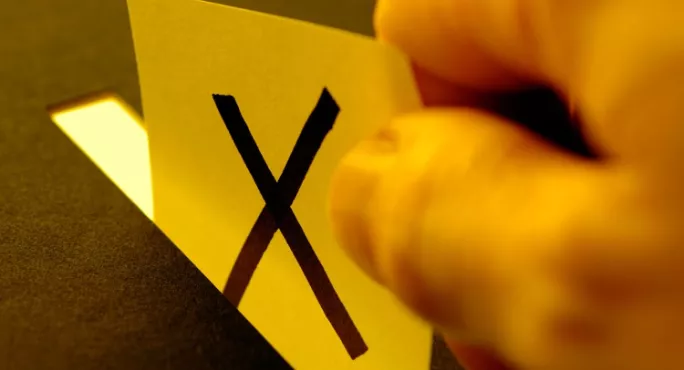- Home
- Election 2019: Why the parties are offering real choice
Election 2019: Why the parties are offering real choice

Whether it’s Labour’s National Education Service, the Conservatives’ pledge of an additional £14 billion of funding or the Liberal Democrats’ promise to hire 20,000 new teachers, education has been one of the top domestic battlegrounds for the coming election. But with the manifestos now published, what do the different parties’ pledges really mean for schools?
Election 2019: School funding
After years of pressure on budgets, it’s reassuring to see that all three major UK parties recognise that greater investment is needed in our school system. The Conservatives are promising a real-terms rise of £4.3 billon a year by 2022-23, an amount that the Institute for Fiscal Studies has confirmed would essentially reverse the 8 per cent per pupil cut that’s occurred since 2010. The Liberal Democrats plan to invest marginally more than the Conservatives, with a real-terms rise of £4.8 billion a year by 2022-23. Meanwhile, Labour is pledging to invest substantially more than either: £25 billion over the first three years, resulting in a £7.5 billion real-terms rise in 2022-23.
The interaction of other education pledges may complicate these figures, notably the potential additional costs of Labour’s aspiration to consider how to "integrate" private schools into the state system.
Supporting teachers
As with funding, all three major parties’ manifestos recognise the pressure teachers are facing. The Liberal Democrats do so most clearly: with Labour, they call out the "crisis in teacher retention and recruitment" and go further by citing the "increasingly unmanageable workload created by unnecessary bureaucracy". Both they and the Conservatives are pledging to raise the starting salary for new teachers to £30,000.
Though all recognise that tackling retention and workload is important, the three parties have different approaches. The Conservatives focus on behaviour, promising to "back heads and teachers on discipline", tackling the serious issue of persistent disruptive behaviour described in Policy Exchange’s recent report It just Grinds You Down. Meanwhile, Labour and the Liberal Democrats instead target inspection and testing as the cause of excessive workload. The Liberal Democrats also promise to introduce a new "properly funded" entitlement to 50 hours of continuous professional development (CPD).
Maintaining academic standards
If there was a degree of consensus on funding and workload, on academic standards the parties disagree on the fundamentals. The Conservatives say having raised standards is one of their "proudest achievements" and want to build on that record, "improving behaviour and promoting knowledge and creativity". Labour, on the other hand, outright opposes "intensified testing, inspection, league tables and competition" and has as flagship pledges the abolition of Ofsted and Sats. The Liberal Democrats, similarly, would abolish Ofsted and Sats, as well as diluting the role of academic performance in league tables.
All three parties recognise the need to ensure a broader curriculum, with pledges to achieve this by introducing an Arts Pupil Premium in primary schools (Labour), an Arts Premium in secondary schools (Conservatives) and abolishing the English Baccalaureate (Liberal Democrats).
Catering for diversity
The Conservative manifesto, unsurprisingly, champions parental choice as the means to ensure that every child receives the education best suited to them. The manifesto contains pledges to "build more free schools", "deliver more school places for children with complex special educational needs" and "to ensure that parents can choose the schools that best suit their children".
Labour takes the opposite approach, promising to abolish academies, restore state schools to local authority control and ensure that "all schools will be subject to a common rulebook". Labour's aspiration on "integrating private schools and creating a comprehensive education system" similarly reinforces its commitment to a one-size-fits-all approach to school education.
The Liberal Democrats, similarly, wish to strengthen the power of local authorities. Though their manifesto also contains positive measures to support teachers and schools to support children with mental health issues.
A genuine choice
All three manifestos meet the basic test of recognising the need to invest significantly and to do more to support teachers, but from there on they diverge.
On funding alone, Labour is the clear winner, pledging to invest more than half as much again as the other two parties. But academic standards would surely suffer from their plans to abolish Ofsted and Sats – as they would, to a lesser extent, under the Liberal Democrats. As set out in Policy Exchange’s 2018 report, Completing the Revolution, a knowledge-rich curriculum benefits children of all backgrounds. The Conservatives and, in particular, the Liberal Democrats, also have more concrete pledges than Labour to support teachers, with both parties committing to a £30,000 starting salary and the latter also promising significant action on CPD. The three parties also have differing philosophies on how to cater for each child’s individual needs: is choice and variety, or increased central control, better to cater for the rich diversity of modern Britain?
Voters who care about our schools will need to decide which elements are most important as they go to the polls.
Iain Mansfield is head of education at the think tank Policy Exchange
Keep reading for just £1 per month
You've reached your limit of free articles this month. Subscribe for £1 per month for three months and get:
- Unlimited access to all Tes magazine content
- Exclusive subscriber-only stories
- Award-winning email newsletters
